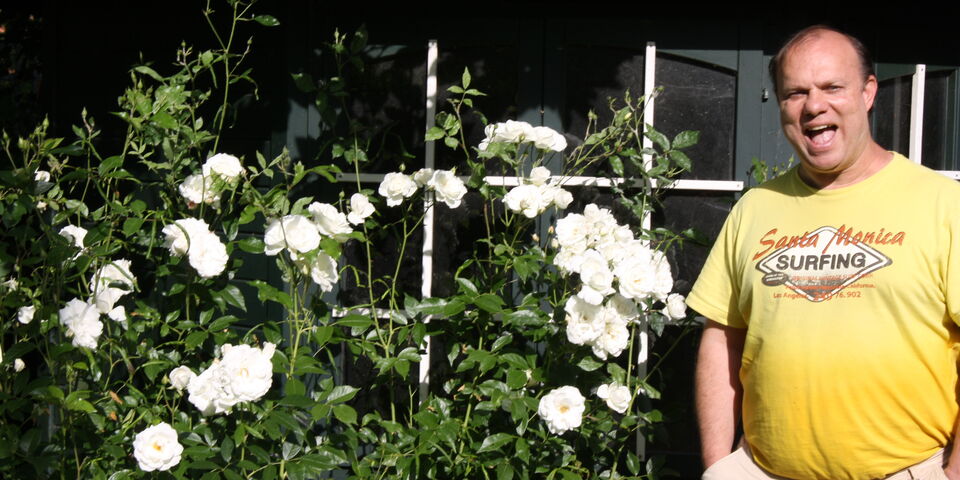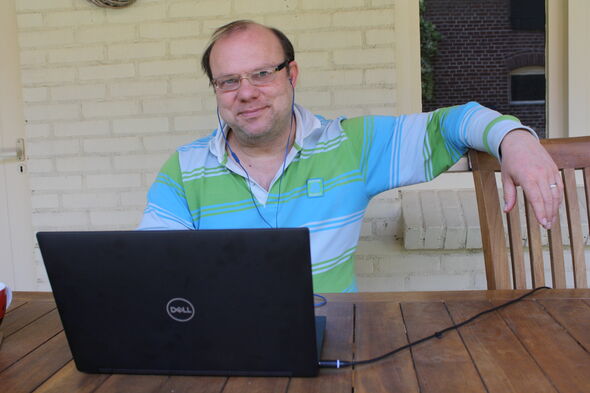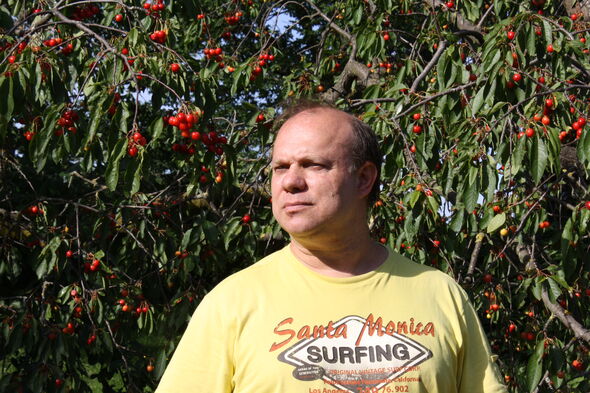“After three weeks I was going a bit nuts”
Working from home during this time of corona crisis has slowly become our new normal. We have learned to work with the changing parameters and to negotiate our own personal pitfalls, adjusting to the demands of homeworking, and missing the campus and each other like never before. Cursor regularly calls a fellow homeworker to hear how they are doing. Today, Marco de Baar, part-time professor of Plasma Fusion Operation and Control and the new director of DIFFER, the NWO institute sited on the TU/e campus.
A small disclaimer upfront: this is a homeworking portrait with a hint of the campus. You see, on the day when we call up Marco de Baar, the campus is where he is to be found, happily ensconced at DIFFER. For, it transpires, a member of the management team is now back on campus every day. Further news: our interview comes only a day after the press release announcing that as Fusion Energy theme leader and MT member since 2014, De Baar is to become the new director of DIFFER.
The appointment process had just gotten underway when the corona crisis erupted in the Netherlands, De Baar explains. “I had my interview with the selection advisory committee before we went into lockdown but things were just starting to go awry in Brabant.” Fortunately, the committee decided in De Baar's favor, and so as of July 1st he can take over the director's baton from Richard van de Sanden.
The symbolic handover of the keys to Rijnhuizen castle in Nieuwegein (where as ‘FOM institute for Plasma Physics Rijnhuizen’ DIFFER used to be located) is the only ceremonial step that has run into delays. In the area of crisis management at DIFFER, De Baar himself has chosen to mark time: “Richard handles this together with institute manager Freya Senf and I said to NWO at the outset, ‘They do it so well, I mustn't disrupt things midway’”.
Read on below the photo.
A long story, but there you have it, he is on campus today, having spent a good two months working entirely from home. For a few weeks now, twenty people max. have been allowed to enter the building each day, and here, with a skeleton staff, the most urgent experiments have been resumed.
This does not alter the fact that many large nuclear fusion facilities and international research programs are still on hold. “Yes, it's fair to say that a good many professional ambitions are now in jeopardy.” Similarly, De Baar is concerned about the progress of some young researchers, particularly internationals who are midway through their doctoral period. “If you've come here from abroad, your building is suddenly off-limits to you and you're stuck in your rented room, unable to go out, that's bound to be a pretty lonely experience.”
Passing on information
Personally, he saw the corona storm coming fairly early on, explains De Baar. In late January he spent a week in Korea and was able to experience developments in China at relatively close range. So, when in mid-March much of the Netherlands finally shut down and working from home became the norm, he wasn't surprised. He counts himself lucky that he is perfectly able to do his own work from home. “It largely consists of passing on and processing information, coordinating with others. To be honest, it's business as usual.”
Likewise, meetings with larger groups, which used to mean hopping on a plane as a matter of course, are going ahead remotely, with barely a hiccup. “For some time I'd been saying, ‘Isn't this all really inefficient, guys? Let's set up a telemeeting instead.’ But no, ‘We can't. You can't do video-conferencing with forty people, can you?’.” The corona crisis provided evidence to the contrary. “And we're seeing more and more virtual conferences being organized, for which you can sign up and pay for a half-day or a session. It totally removes the need to fly and spend a few days in, say, the US.”
Intense concentration
Despite the smooth continuation of his work in a practical sense, on a personally level it did take De Baar a little while to find a healthy approach at home, he admits. “There's a certain routine to a normal working day. Get up, take the train to Eindhoven, walk to my building, do my work. Along the way you are regularly 'waylaid', you chat to people, you have to stop what you're doing to arrange something, you take a walk. Your day involves a series of minor interruptions that relax the intense concentration for a short while.”
One of the problems of this whole corona shit is that it is difficult to really look ahead. Which can easily make you somber
Were things so different at his farm in Roermond, Limburg? “I was getting up at seven, sitting down at my laptop at a quarter past seven, and then going at it pedal to the metal until seven, seven thirty in the evening. After about three weeks I noticed I'd become a bit of a grump. At one point, I sat there staring at my screen, moving the mouse from left to right, pretty aimlessly. This is not good, I realized right then. I said to my wife, ‘I think I'm going a bit nuts’. ‘I twigged that a while ago, dearest,’ my wife replied.”
This has to change, was the quickly drawn conclusion. “One of the problems of this whole corona shit is that it is difficult to really look ahead. Which can easily make you somber. This has prompted us to set achievable goals, like making an herb garden and planting some shrubs outdoors.”
Not that he has particularly green fingers, however: “I'm someone who prefers to lie rather than work in the garden,” De Baar says laughingly. “But this is exactly the right time to take on a project like this. We've been living here for a couple of years now; we moved from a little flat to a house with a huge garden. It never really struck us during the first two years, but in the third we thought, ‘What a monster’. Last year we got a firm of gardeners involved and they spent five days going at it with a team of three. Now we are going to tackle the garden ourselves.” Lifting, turning the soil, hoeing, digging, planting - the couple are hard at work every weekend. ‘Had to use an axe to cut through old roots. Feel great now!’ tweeted De Baar just the other day.
Read on below the photo.
It has created a better balance, he says. And yes, his wife is also pleased that her husband is spending more time at home. “Some of the time I work downstairs at the dining table. My wife will bring me a cup of coffee now and then and we'll have a laugh. When I have a more serious meeting, I like to be alone so I head upstairs.”
Proof on a beer mat
“That is a very big question,” he says when asked how he is experiencing the corona crisis. The complexity of the situation is what primarily interests him, he says. This is a situation in which forms of interaction between people are playing a key role and in which we are having to choose strategies when our knowledge is often limited. Social media he finds no less “intriguing”, media “on which people without any background knowledge attempt to demonstrate on a beer mat that RIVM is taking entirely the wrong tack. It never fails to astound me. The climate debate is another place you see this happening - and it's the same people, I think.”
But actively getting involved in these online discussions is something he rarely does. “On Twitter I constantly see people who are normally very rational suddenly fly off the handle. I'm hesitant to get involved, I mean, at the end of the day what do I know? But there is one point I will venture to make: we've got to trust science, to my mind that is the best thing you can do.” He continues, “I also try to stick to the lockdown rules as much as I can; for example, I only leave the house when I really need something. In that respect I'm very obedient. For the rest my abiding thought is: we'll have to look back on this in five years' time.”
De Baar is keen to stress that he is well aware of his own privileges. “It's wonderful living here. I only have to open the sliding doors and I have my own park. The need that many people feel to get out of the house is one I understand - but I don't have it myself.” Moreover, he says he is amazed by the optimism of many people. “Perhaps I'm a bit of a pessimist in this respect, and I am certainly completely incompetent when it comes to this - so actually I don't want to venture to make any predictions. But as long as we don't develop some antibodies and there is no vaccine, it seems to me that we'll be stuck with this for years to come.”




Discussion